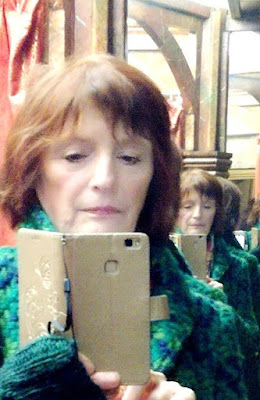Guest Post from Viccie Corby
Musings on Reading and Writing...and Life
By Viccie Corby
Recently I read an interview with a reasonably well known writer who declared that she never read novels while she was in the middle of writing because she wanted ‘her style to remain pure.’
I can’t
help wondering what she’s so afraid of. True I can see that if she’s writing a
thriller which has a short, sociable, butterfingered hero, then maybe she ought
to lay off reading Lee Child lest she find her protagonist morph into an
immensely tall loner. Is she worried that if she picks up Philip Roth her sentences
are going to become longer or that if she relaxes with a formula romance (a
surprising amount of high achieving women do) she is going to start gaily leavening
every sentence with colourful, descriptive, meaningful adjectives? Why? She’s
published with her own style and several books under her belt.
When I
was younger I’ll admit I was often influenced by my favourite authors,
sometimes beneficially, other times less so. I started writing halfway decent
dialogue after discovering Evelyn Waugh and Ian McEwan has set a standard for
tight writing that I can only aspire to. I also adored Georgette Heyer and my
first novel was littered with poor imitations of her wit and sentence
structure. The upside was that even though I knew it was derivative I had an absolute
ball writing my 100,000 word story and I proved to myself that I could go the
distance.
The more
you write, the more you develop your own voice and the less you’ll be directly
influenced by what you read. You’ll probably be influenced a little which is as
it should be. Does anyone seriously think Monet never looked at a friend’s
painting and thought, ‘That’s a clever way with brushstrokes…?’ While it’s
probably wiser not to binge read novels set small town America while you’re in
the middle of crafting your own small town masterpiece, reading Margaret Atwood
while you write that novel is not going to turn you into Margaret Atwood
manqué. You have your own style, your own voice and it’s not hers but why
shouldn’t you examine the way she puts her stories together, her sentence
structure, anything you admire and see if some of her techniques might not
improve your own craft? It’s not plagiarism. It’s not copying. It’s what all
craftspeople who want to go on improving do. It’s called learning from others.
Reading
master writers is a pleasure, the works of the less skillful possibly less so
but ploughing through absolute lulus can be an object lesson in how not to
write (as well as the source of enjoyable discussions about how did this rubbish
get published). That’s why it’s such a good idea to belong to a book group
because being in one makes you try books that you’d never normally even look
at.
I read
about 18 books a year for my two book groups and at least four or five would be
abandoned in the first few chapters if I’d picked them up in the normal way. However
I’m forced to make a stab at finishing the horrid things because I’ve got to
discuss them later and talking about why books don’t work is very useful even
when you’re the only writer in the group. One word of warning: non writers
aren’t critical in the same way as writers. A novel about the Spanish Civil War
was loved for its subject matter and none of the others noticed that the
narrative was littered with phrases such as “His feral
brows hung over his eyes like a pair of awnings” or “Had it been their nature to reflect and expand, there would
have been the genesis moments of bovine religious movements” (he’s describing
cows). To be honest I’ve never written like that so I didn’t
lean much from the writing aspect but this month’s book was different. It was light fiction about climbing
Everest and another I didn’t enjoy. We all agreed it had potential but was
dragged down by too much back story, an extraneous romance and an avalanche of detail
about the mechanics of mountain climbing. My current work in progress is
totally different but there was a lot of back story. There’s less now.
Don’t
feel guilty about indulging in page turners and not always burying yourself in
literary fiction either; variety is the key and genre novels are often very
well constructed. They might not be what you want to write, even if you enjoy
reading them, but their better authors know how to catch your attention, how to
keep up the pace and how to put in loads of detail without it coming over as
info dump or as if they’ve got through the local tourist guide and dropped in
whole sections.
So the
next time someone catches you reading something fat with a brightly coloured
cover say blandly that it’s research. The only thing to watch out for is that
sometimes the need to finish the next chapter or three in your “research” can
seriously cut into your writing time.
Victoria Corby heads up the
Bordeaux Writers Group s English and has been living in the area for (gulp) 25
years. True Bordelais have picked grapes. Victoria is one (it's very hard
work). She’s lived in Australia and Hong Kong as well as the UK and has
worked in sales, advertising, magazine editorial, the wine trade, and currently
as a tour guide. She has had three novels published by Headline in the UK --Something Stupid, Seven Week Itch and Up To No Good -- which were translated into German and Thai. She currently has two very different works on the go.
Contact info: bordeaux.writers.group@gmail.com



Comments
Post a Comment